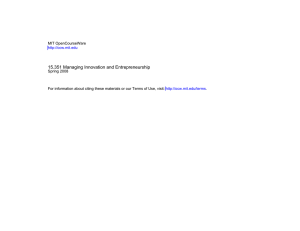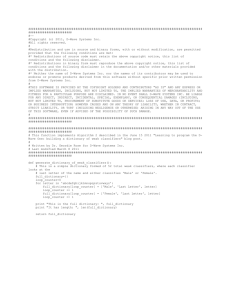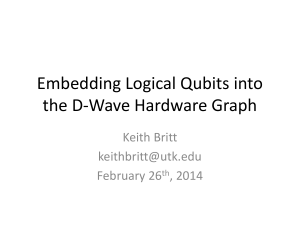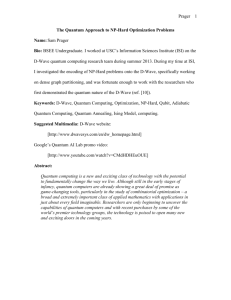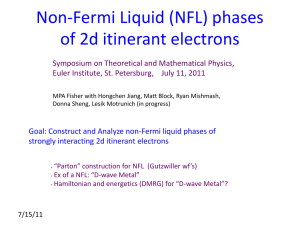SC07 powerpoint slides
advertisement
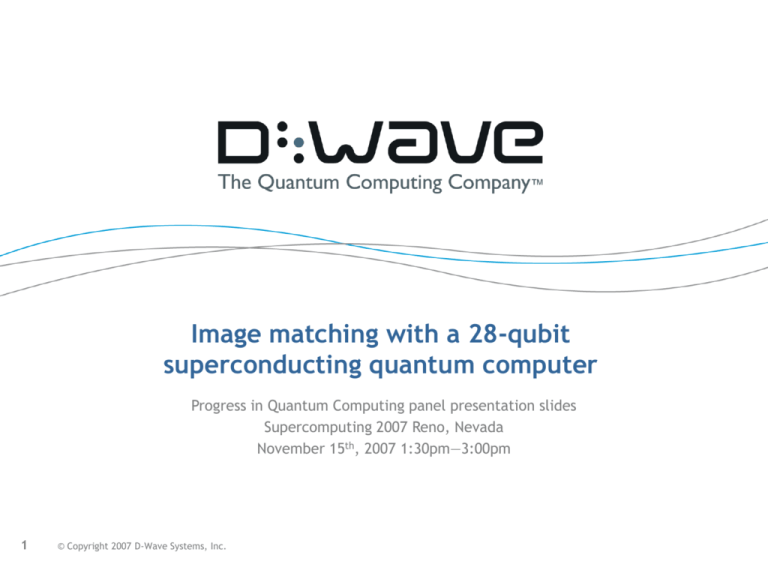
Image matching with a 28-qubit
superconducting quantum computer
Progress in Quantum Computing panel presentation slides
Supercomputing 2007 Reno, Nevada
November 15th, 2007 1:30pm—3:00pm
1
© Copyright 2007 D-Wave Systems, Inc.
Image matching technical leads
•
Image matching algorithms and applications
Dr. Hartmut Neven, Technical Lead Manager
neven@google.com
•
Quantum computing algorithms and hardware
Dr. Geordie Rose, Chief Technology Officer
rose@dwavesys.com
2
© Copyright 2007 D-Wave Systems, Inc.
Prologue: D-Wave
•
Only pure play company in two categories: quantum
computation and superconducting computing systems
•
Best financed & largest effort in both categories
•
More granted US QC patents than all other corporations
(IBM, Microsoft, HP, NEC, …) combined
•
Empirical high-throughput philosophy; Eight full processor
design cycles completed so far in 2007
•
Core technical team TRW, NASA, JPL, MDA, Kodak,
Electronic Arts, LSI Logic, top computer science & physics
research scientists
3
© Copyright 2007 D-Wave Systems, Inc.
Overview
•
Our system: The problem we solve
•
How superconducting AQCs work: Some physics
•
Case study: Solving image matching problems with a
D-Wave quantum computing system
4
© Copyright 2007 D-Wave Systems, Inc.
Demo system is a web services QUBO solver
• Quadratic Unconstrained Binary Optimization:
Minimize E over binary variables xi ; hi & Jij
N
N
i 1
i j 1
E ( x1 ,, xN ) hi xi J ij xi x j
5
© Copyright 2007 D-Wave Systems, Inc.
High-level systems architecture
h , Jˆ
QUBO out
Local solver engine
Quantum computer
x
Solution returned
User data
6
© Copyright 2007 D-Wave Systems, Inc.
Under the Hood:
D-Wave quantum processors
7
© Copyright 2007 D-Wave Systems, Inc.
A problem with a split personality
• QUBO
is equivalent to the two-dimensional Ising model in a
magnetic field (2DIMM) problem
8
© Copyright 2007 D-Wave Systems, Inc.
What this problem means to a computer scientist
• QUBO is NP-hard ; the decision version is NP-complete
Few technical terms have gained such rapid notoriety as the
appellation “NP-complete”. In the short time since its
introduction in the early 1970s, this term has come to symbolize
the abyss of inherent intractability that algorithm designers
increasingly face as they seek to solve larger and more complex
problems.
Computers and Intractability: A Guide to the Theory of NP-Completeness
Michael R. Garey and David S. Johnson
9
© Copyright 2007 D-Wave Systems, Inc.
What this problem means to a physicist
• Model for describing real physical systems
The Ising model tries to imitate behaviour in which individual
elements (e.g., atoms, animals, protein folds, biological
membrane, social behavior, etc.) modify their behavior so as to
conform to the behavior of other individuals in their vicinity…
More than 12,000 papers have been published between 1969 and
1997 using the Ising model.
http://scienceworld.wolfram.com/physics/IsingModel.html
10
© Copyright 2007 D-Wave Systems, Inc.
Core concept:
Use (quantum) physics to do math
• Deep connection between hard math problem and fundamental
laws of nature
• Build an “analog computer” at the ultimate limits of what is
possible… any computer that could do better would violate the
laws of physics
Math
Physics
11
© Copyright 2007 D-Wave Systems, Inc.
Our approach:
Superconducting adiabatic quantum computer
• Extremely fast: Special purpose processor; superconducting
electronics are naturally fast (700+ GHz)
• Extremely low power: In principle reversible (zero heat
generation); in practice power consumption & heat
generation drastically reduced (factors of millions)
• At the limits of physics: Universal quantum computer… can’t
do better
12
© Copyright 2007 D-Wave Systems, Inc.
Device schematic: Niobium CJJ RF-SQUID flux qubit
Compound Josephson
junction (CJJ) loop
Qubit loop
c
Two currents in
13
© Copyright 2007 D-Wave Systems, Inc.
x
One current out
14
© Copyright 2007 D-Wave Systems, Inc.
Device physics: The Hamiltonian
20
2e 2 2
2
H
cos cos 2 x
2
8 L
C 2
0 Ic
c
Potential energy: cosine + parabola
15
© Copyright 2007 D-Wave Systems, Inc.
Potential energy can be programmed by user
E
c
2
2
02
2
e
2
H
cos cos 2 x
2
8 L
C 2
0 I c
16
© Copyright 2007 D-Wave Systems, Inc.
Qubit manipulation: c modulates barrier height
17
© Copyright 2007 D-Wave Systems, Inc.
Qubit manipulation: x tilts double well
18
© Copyright 2007 D-Wave Systems, Inc.
Readout basis: Direction of circulating current
H t h x t z c t x
19
© Copyright 2007 D-Wave Systems, Inc.
|0>
|1>
Device schematic: Symmetric bipolar coupler
20
© Copyright 2007 D-Wave Systems, Inc.
21
© Copyright 2007 D-Wave Systems, Inc.
Models of computation:\\adiabatic quantum computation
•
Computer initialized in “easy to
reach” (convex) ground state
•
Answer encoded in final state
•
All currents adjusted slowly enough
so that system remains in ground
state at all times
•
AQC can be universal for QC
•
AQC is exact by definition
22
© Copyright 2007 D-Wave Systems, Inc.
H 1 s H B s H P
Models of computation:\\quantum annealing
•
Computer initialized in ground state
•
Answer encoded in final state
•
All currents adjusted over period of
time fixed by user
•
QA is a heuristic algorithm
H 1 s H B s H P
23
© Copyright 2007 D-Wave Systems, Inc.
Processor designed to enable AQC/QA
28
28
i 1
i 1
H t i t xi hi t zi
24
© Copyright 2007 D-Wave Systems, Inc.
28
i
j
J
t
ij z z
i , jE
Problem Hamiltonian = desired QUBO
N
N
H t i t hi t
i
x
i 1
i 1
i
z
N
J t
i , jE
i
z
ij
j
z
H 1 s H B s H P
N
N
HB i
H P hi
i
x
i
z
i1
25
i1
© Copyright 2007 D-Wave Systems, Inc.
N
J
i, j E
ij
i
z
j
z
A simple operating prescription
1. Set CJJ biases to maximally lower barriers
N
H B i xi
i1
2. Raise {h,J} biases to target values
N
N
H t i t hi t
i
x
i 1
3. Ramp CJJ biases to large barriers
N
H P hi
i
z
4. Read out qubits
26
i1
© Copyright 2007 D-Wave Systems, Inc.
i 1
N
J
i, j E
i
z
ij
i
z
j
z
N
J t
i , jE
ij
i
z
j
z
Image matching
• This
is hard: Automated object recognition is a foundational
artificial intelligence problem known to be very difficult for
designed (as opposed to evolved) computers
27
© Copyright 2007 D-Wave Systems, Inc.
Image matching
• Given two images
28
© Copyright 2007 D-Wave Systems, Inc.
Image matching
• Identify interest points in each image
29
© Copyright 2007 D-Wave Systems, Inc.
Image matching
• Generate local description of all interest points
(local wavelet transform feature vectors)
j
30
rj 0.31, 0.01, , 0.03
© Copyright 2007 D-Wave Systems, Inc.
Image matching
• Define point-wise similarity between interest point j in
image 1 and interest point in image 2 to be inner
product of feature vectors
j
31
r j r
© Copyright 2007 D-Wave Systems, Inc.
Image matching
• Generate relational description of all pairs of interest points
j
s jk 0.22, 0.05, , 0
k
32
© Copyright 2007 D-Wave Systems, Inc.
Image matching
• Define relational compatibility of a pair (j,k) from first image and
a pair (,) from second image
s jk s
33
© Copyright 2007 D-Wave Systems, Inc.
Image matching as a QUBO
• Quadratic Unconstrained Binary Optimization problem:
Minimize E over binary variables x[ i, ]
• The set of all pairs {iG1,G2} where x[ i, ]=1 gives the region
and size of maximum overlap
M
E ( x[1,1] ,, x[ N ,M ] ) ri r x[i , ]
M
N
i 1 1
Favors point-wise similarity
34
© Copyright 2007 D-Wave Systems, Inc.
i j 1
N
1
sij s x[i , ] x[ j , ]
Favors relational compatibility
Show Demo
35
© Copyright 2007 D-Wave Systems, Inc.
Summary of preliminary results
• A set of progressively more powerful superconducting
quantum processors have been built
• Next generation Q3/2008 targets competition with incumbent
QUBO solver methods (500+ qubits)
• Web services architecture operational at several levels of
abstraction from hardware; APIs documented and available
36
© Copyright 2007 D-Wave Systems, Inc.
